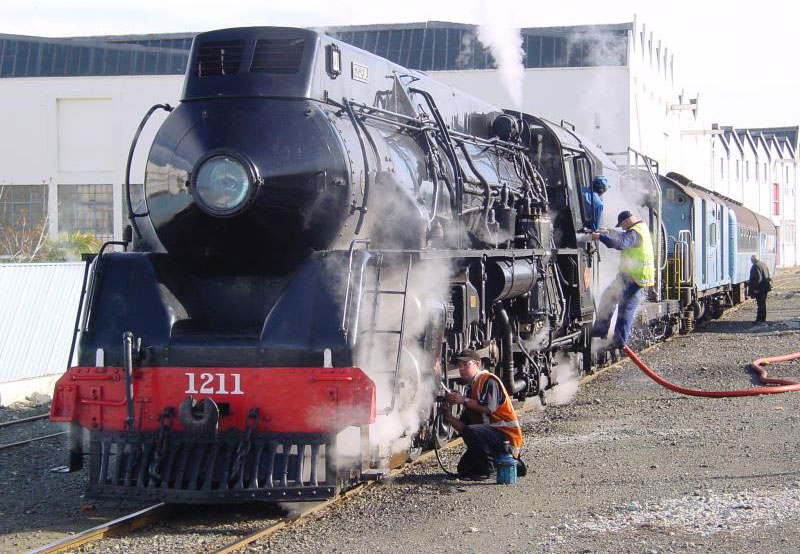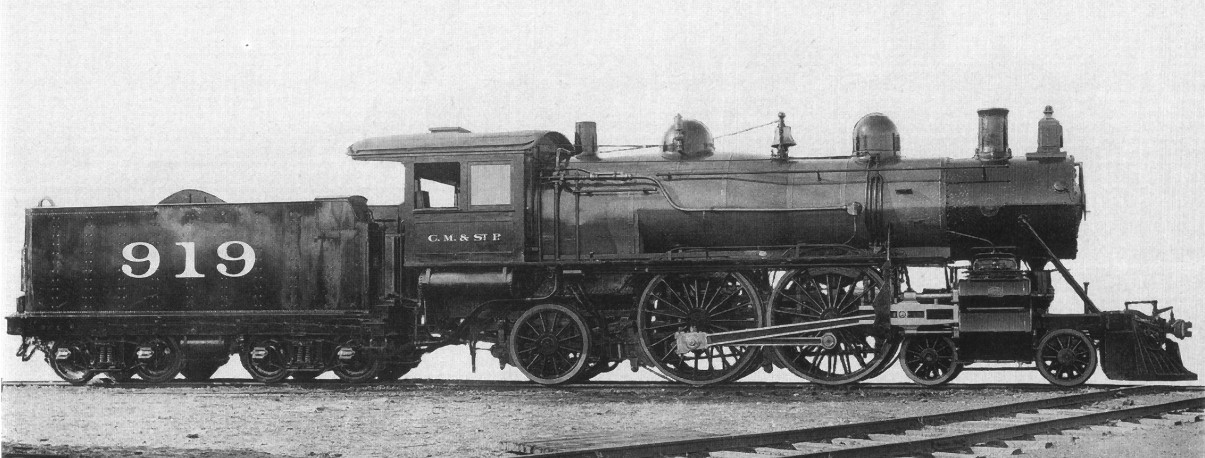|
LMS Compound 4-4-0
The London, Midland and Scottish Railway Compound 4-4-0 was a class of steam locomotive designed for passenger work. Overview One hundred and ninety five engines were built by the LMS, adding to the 45 Midland Railway 1000 Class, to which they were almost identical. The most obvious difference is that the driving wheel diameter was reduced from on the Midland locomotive to on the LMS version. They were given the power classification 4P. The LMS continued the Midland numbering from 1045 to 1199 and then started in the lower block of 900–939. After nationalisation in 1948, BR added 40000 to their numbers so they became 40900–40939 and 41045–41199. Accidents and incidents *On 8 January 1929, locomotive 1060 was hauling an express passenger train from Bristol to Leeds, Yorkshire when it overran signals at , Gloucestershire and collided with a freight train that was being shunted. Four people were killed. *On 13 March 1935, locomotive No. 1165 was hauling a milk trai ... [...More Info...] [...Related Items...] OR: [Wikipedia] [Google] [Baidu] |
North British Locomotive Company
The North British Locomotive Company (NBL, NB Loco or North British) was created in 1903 through the merger of three Glasgow locomotive manufacturing companies; Sharp, Stewart and Company (Atlas Works), Neilson, Reid and Company (Hyde Park Works) and Dübs and Company (Queens Park Works), creating the largest locomotive manufacturing company in Europe and the British Empire. Its main factories were located at the neighbouring Atlas and Hyde Park Works in central Springburn, as well as the Queens Park Works in Polmadie. A new central Administration and Drawing Office for the combined company was completed across the road from the Hyde Park Works on Flemington Street by James Miller in 1909, later sold to Glasgow Corporation in 1961 to become the main campus of North Glasgow College (now Glasgow Kelvin College). The two other Railway works in Springburn were St. Rollox railway works, owned by the Caledonian Railway and Cowlairs railway works, owned by the North British Railway ... [...More Info...] [...Related Items...] OR: [Wikipedia] [Google] [Baidu] |
Bristol
Bristol () is a city, ceremonial county and unitary authority in England. Situated on the River Avon, it is bordered by the ceremonial counties of Gloucestershire to the north and Somerset to the south. Bristol is the most populous city in South West England. The wider Bristol Built-up Area is the eleventh most populous urban area in the United Kingdom. Iron Age hillforts and Roman villas were built near the confluence of the rivers Frome and Avon. Around the beginning of the 11th century, the settlement was known as (Old English: 'the place at the bridge'). Bristol received a royal charter in 1155 and was historically divided between Gloucestershire and Somerset until 1373 when it became a county corporate. From the 13th to the 18th century, Bristol was among the top three English cities, after London, in tax receipts. A major port, Bristol was a starting place for early voyages of exploration to the New World. On a ship out of Bristol in 1497, John Cabot, a Venetia ... [...More Info...] [...Related Items...] OR: [Wikipedia] [Google] [Baidu] |
Standard Gauge Steam Locomotives Of Great Britain
Standard may refer to: Symbols * Colours, standards and guidons, kinds of military signs * Standard (emblem), a type of a large symbol or emblem used for identification Norms, conventions or requirements * Standard (metrology), an object that bears a defined relationship to a unit of measure used for calibration of measuring devices * Standard (timber unit), an obsolete measure of timber used in trade * Breed standard (also called bench standard), in animal fancy and animal husbandry * BioCompute Standard, a standard for next generation sequencing * ''De facto'' standard, product or system with market dominance * Gold standard, a monetary system based on gold; also used metaphorically for the best of several options, against which the others are measured * Internet Standard, a specification ratified as an open standard by the Internet Engineering Task Force * Learning standards, standards applied to education content * Standard displacement, a naval term describing the weig ... [...More Info...] [...Related Items...] OR: [Wikipedia] [Google] [Baidu] |
Scrapped Locomotives
Scrap consists of recyclable materials, usually metals, left over from product manufacturing and consumption, such as parts of vehicles, building supplies, and surplus materials. Unlike waste, scrap has monetary value, especially recovered metals, and non-metallic materials are also recovered for recycling. Once collected, the materials are sorted into types — typically metal scrap will be crushed, shredded, and sorted using mechanical processes. Scrap recycling is important for creating a more sustainable economy or creating a circular economy, using significantly less energy and having far less environmental impact than producing metal from ore. Metal recycling, especially of structural steel, ships, used manufactured goods, such as vehicles and white goods, is a major industrial activity with complex networks of wrecking yards, sorting facilities and recycling plants. Processing Scrap metal originates both in business and residential environments. Typically a "scrapper" ... [...More Info...] [...Related Items...] OR: [Wikipedia] [Google] [Baidu] |
Railway Locomotives Introduced In 1924
Rail transport (also known as train transport) is a means of transport that transfers passengers and goods on wheeled vehicles running on rails, which are incorporated in tracks. In contrast to road transport, where the vehicles run on a prepared flat surface, rail vehicles (rolling stock) are directionally guided by the tracks on which they run. Tracks usually consist of steel rails, installed on sleepers (ties) set in ballast, on which the rolling stock, usually fitted with metal wheels, moves. Other variations are also possible, such as "slab track", in which the rails are fastened to a concrete foundation resting on a prepared subsurface. Rolling stock in a rail transport system generally encounters lower frictional resistance than rubber-tyred road vehicles, so passenger and freight cars (carriages and wagons) can be coupled into longer trains. The operation is carried out by a railway company, providing transport between train stations or freight customer faciliti ... [...More Info...] [...Related Items...] OR: [Wikipedia] [Google] [Baidu] |
Compound Locomotives
A compound locomotive is a steam locomotive which is powered by a compound engine, a type of steam engine where steam is expanded in two or more stages. The locomotive was only one application of compounding. Two and three stages were used in ships, for example. Compounding became popular for railway locomotives from the early 1880s and by the 1890s were becoming common. Large numbers were constructed, mostly two- and four-cylinder compounds, in France, Germany, Austria, Hungary, and the United States. It declined in popularity due to maintenance issues and because superheating provided similar efficiencies at lower cost. Nonetheless, compound Mallets were built by the Norfolk and Western Railway right up to 1952. Introduction In the usual arrangement for a compound engine the steam is first expanded in one or two high-pressure ''(HP)'' cylinders, then having given up some heat and lost some pressure, it exhausts into a larger-volume low-pressure ''(LP)'' cylinder, (or two, - or ... [...More Info...] [...Related Items...] OR: [Wikipedia] [Google] [Baidu] |
Vulcan Foundry Locomotives
Vulcan may refer to: Mythology * Vulcan (mythology), the god of fire, volcanoes, metalworking, and the forge in Roman mythology Arts, entertainment and media Film and television * Vulcan (''Star Trek''), name of a fictional race and their home planet and language in the ''Star Trek'' franchise * Black Vulcan, a fictional African American superhero on the animated series ''Super Friends'' * Kamen Rider Vulcan, a character in the series ''Kamen Rider Zero-One'' * Vulcan, a fictional planet in the ''Doctor Who'' season ''The Power of the Daleks'' Print * ''Vulcan'' (Fleetway), a 1975–1976 IPC Comic * Vulcan (DC Comics), a fictional character * Vulcan (Marvel Comics), a fictional supervillain * ''Vulcan!'', a 1978 ''Star Trek'' novel by Kathleen Sky * ''The Vulcan'', a magazine from various organizations within the Young Fine Gael * ''Vulcan'', a gay pornography magazine, made famous in a High Court test case by serial killer Dennis Nilsen * Vulcan, a fictional series of artifi ... [...More Info...] [...Related Items...] OR: [Wikipedia] [Google] [Baidu] |
NBL Locomotives
NBL may refer to: Business * Namibia Breweries Limited * National Bank Limited, the first private sector bank fully owned by Bangladeshi entrepreneurs * Nepal Bank Limited * Noble Energy, a former oil and natural gas exploration and production company with the NYSE ticker symbol NBL, now part of Chevron Corporation * North British Locomotive Company Science * n-Butyllithium, an organic compound * Neutral Buoyancy Laboratory, an astronaut training facility at NASA's Johnson Space Center * New Brunswick Laboratory Sports * National Badminton League (United Kingdom) * National Basketball League (other) * National Bicycle League (United States) * National Bowling League (United States) – defunct * North Bay League, now part of the North Coast Section (NCS) of the California Interscholastic Federation (CIF) Other uses * North Berwick Law, a volcanic plug in East Lothian, Scotland, United Kingdom * Northumberland, county in England, Chapman code * ''Nuestra Belleza ... [...More Info...] [...Related Items...] OR: [Wikipedia] [Google] [Baidu] |
Hertfordshire
Hertfordshire ( or ; often abbreviated Herts) is one of the home counties in southern England. It borders Bedfordshire and Cambridgeshire to the north, Essex to the east, Greater London to the south, and Buckinghamshire to the west. For government statistical purposes, it forms part of the East of England region. Hertfordshire covers . It derives its name – via the name of the county town of Hertford – from a hart (stag) and a ford, as represented on the county's coat of arms and on the flag. Hertfordshire County Council is based in Hertford, once the main market town and the current county town. The largest settlement is Watford. Since 1903 Letchworth has served as the prototype garden city; Stevenage became the first town to expand under post-war Britain's New Towns Act of 1946. In 2013 Hertfordshire had a population of about 1,140,700, with Hemel Hempstead, Stevenage, Watford and St Albans (the county's only ''city'') each having between 50,000 and 100,000 r ... [...More Info...] [...Related Items...] OR: [Wikipedia] [Google] [Baidu] |
King's Langley
Kings Langley is a village, former manor and civil parish in Hertfordshire, England, north-west of Westminster in the historic centre of London and to the south of the Chiltern Hills. It now forms part of the London commuter belt. The village is divided between two local government districts by the River Gade with the larger western portion in the Borough of Dacorum and smaller part, to the east of the river, in Three Rivers District. It was the location of Kings Langley Palace and the associated King's Langley Priory, of which few traces survive. It is situated south of Hemel Hempstead and north of Watford. The earliest mention in surviving documents of the manor of ''Langalega'' is in a Saxon charter dated ''circa'' 1050. It appears as ''Langelai'' in the Domesday Book of 1086, and is recorded as ''Langel' Regis'' ("Langley of the King") in 1254. The name means "long wood or clearing". History A Roman villa has been excavated just south of the village. [...More Info...] [...Related Items...] OR: [Wikipedia] [Google] [Baidu] |



.jpg)